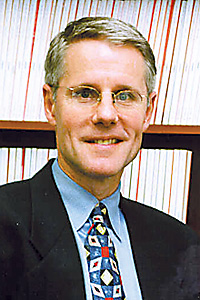At age 56, David White says he has at least "10 years of kick" left in him and he wants to spend that time redefining the sleep industry. The best way to do that, says Respironics' new chief medical officer, is through product development and shaking up convention.
"I've done extensive research on the physiology of sleep--what causes disorders and their consequences--but it has translated into very little change in how we treat them," said White, who most recently served as director of the clinical sleep disorders program at Brigham and Women's Hospital in Boston. "CPAPs have gotten better, quieter and smaller, but it's basically the same therapy. I think it would be exciting to change the paradigm and do something that ends up changing how we address breathing abnormalities."
An Atlanta native, White trained as a critical care pulmonologist and served many years in that position before becoming interested in sleep science. His long list of credentials includes professor of sleep medicine at Harvard Medical School; editor-in-chief for SLEEP, the journal of the American Sleep Disorders Association; and pulmonary fellow at the University of Colorado Health Science Center.
He also chairs the committee that oversees the American Board of Medical Specialties' board exam in sleep medicine.
It was during his time in Denver that he worked under renowned pulmonologist Tom Petty, M.D., commonly referred to as the "father of home oxygen."
"With David, it's 'turn on the light and get out of his way,'" Petty said about his protege. "He is a world-class clinician. Respironics could not have made a better choice."
As its revenues crest the $1 billion mark, Respironics is poised to create new breakthroughs in sleep device manufacturing and having White in the fold can provide a scientific perspective the company hasn't had before, said CEO John Miclot.
"One of our stated strategies has been to broaden our portfolio and Dr. White will be instrumental in the execution of that strategy," Miclot said. "As one of the foremost thinkers in the sleep field, Dr. White has long believed that there isn't a strong enough connection between academics and business. The market is ripe for new technology, and he can help us with the feasibility of ideas and take them through the process."
Likewise, White said he's anxious to know the industry side of sleep and looks forward to learning about the processes involved with product design, development and marketing.
"I want to have a thorough understanding of how a business that is devoted to health care works," he said.
While he admits to having some ideas for innovative new products, White declined to offer any specifics about them. He did, however, present a general outline of his thinking:
"The CPAP treatment works great, but it is not very tolerable and that is reflected in the low compliance rate," he said. "The nuts and bolts of my ideas focus on the premise that there isn't one single therapy for everyone; rather, there should be a variety of therapies for sub-segments of the population."
As a veteran sleep specialist, White has had a chance to interact with HME providers as a CPAP referral source and says they perform a valuable service. He also believes, however, that there needs to be more consistency in the type of care they provide.
"Under ideal circumstances, they are great," he said. "But it's highly variable. Some providers are very conscientious and professional, while others do it very poorly. This isn't just true with providers--the same can be said about sleep labs. Anyone can start one up without any formal education."
White should give the sleep industry more credibility with the medical establishment, which he acknowledges views the business end with a jaundiced eye.
"My gestalt is that this will lead to better products," he said. "The medical field has traditionally seen industry as a bad guy, but the reality is that physicians need products to care for their patients."
White also provides a connection with the academic world. He plans to remain in Boston, interacting with his peers on idea generation.
"There's a lot of intellectual horsepower in the sleep arena here," he said.




Comments